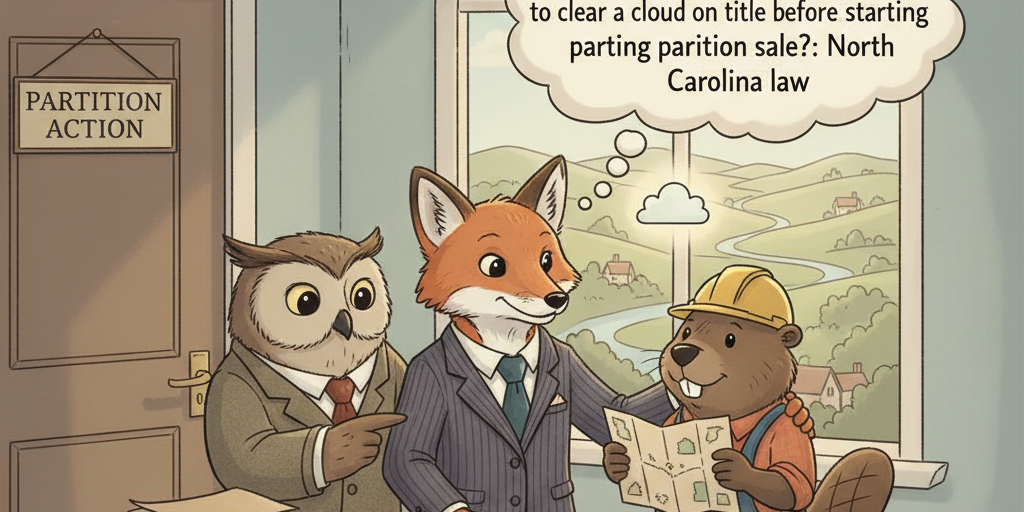Can I require a quiet title action to clear a cloud on title before starting a partition sale? – North Carolina
Short Answer
Under North Carolina law, you do not have to file a separate quiet title lawsuit before starting a partition proceeding. The Clerk of Superior Court can open a partition case and address routine title questions there. But if someone genuinely disputes ownership or the shares involved, the clerk must transfer those title issues to Superior Court, which can delay a sale. In practice, a separate quiet title action may be the faster way to clear a serious cloud so a partition sale can proceed smoothly.
Understanding the Problem
You want to know whether, in North Carolina, you can or must file a quiet title case to clear a cloud on title before you file a partition sale. Here, the records already show a cloud on title.
Apply the Law
North Carolina allows any cotenant to file a partition special proceeding with the Clerk of Superior Court in the county where the land lies. The clerk can appoint commissioners, divide the land, or order a sale when physical division is impractical or unfair. Clouds on title do not automatically block filing. However, when a pleading raises a real dispute over who owns the property or what shares each person holds, the clerk must send those disputed issues to a Superior Court judge for trial. A quiet title action is a separate civil case designed to remove adverse claims or ambiguities; it is not a legal prerequisite to partition, but it can be useful if the title cloud would otherwise stall or depress the sale.
Key Requirements
- Cotenancy: You or another owner must hold the property as a tenant in common or similar shared ownership.
- Proper parties and notice: All owners and interested claimants must be named and properly served; unknown or unlocatable persons require service by publication and a guardian ad litem.
- Forum: File the partition as a special proceeding with the Clerk of Superior Court in the county where the land is located.
- Disputed title issues: If a party disputes ownership or shares, the clerk must transfer those issues to Superior Court for resolution.
- Sale mechanics: If a sale is ordered, it follows North Carolina’s judicial sale process, including the 10‑day upset bid period, before confirmation and deed delivery.
What the Statutes Say
- North Carolina Gen. Stat. § 41-10 (Quiet title) – Allows a civil action to remove clouds on title or adverse claims.
- North Carolina Gen. Stat. § 1-301.2 (Special proceedings; transfer/appeal) – Requires transfer to Superior Court when pleadings raise factual disputes or equitable issues in special proceedings.
- North Carolina R. Civ. P. 4 (Service of process) – Governs service, including service by publication for unknown or unlocatable parties.
- North Carolina Gen. Stat. § 1-339.1 (Judicial sales) – Sets procedures for court‑ordered sales, including upset bids and confirmation.
Analysis
Apply the Rule to the Facts: Because the records show a cloud on title, you can still file for partition in the Clerk’s office. If someone contests who the owners are or their shares, the clerk must send those title questions to a Superior Court judge. A separate quiet title case is not required but may be practical to clear the cloud first, reduce transfer delays, and support a better sale outcome.
Process & Timing
- Who files: Any cotenant. Where: Clerk of Superior Court in each county where a parcel lies (e.g., Columbus County and Bladen County). What: Verified partition petition and Special Proceedings Summons (AOC‑SP‑100) for each respondent; arrange Rule 4 service, including publication for unknowns. When: No fixed deadline to file; allow extra time for publication and guardian appointments.
- Clerk reviews parties and service, may appoint a guardian ad litem for unknown/minor/incompetent parties, and may appoint commissioners. If physical division is impractical or unfair, the clerk can order a sale. Title disputes raised in pleadings are transferred to Superior Court; the partition continues after the judge decides those issues.
- For a sale, follow judicial sale procedures with a 10‑day upset bid period. After confirmation, the commissioner delivers a deed; the clerk addresses costs, any allowed contribution credits (e.g., taxes/insurance/necessary upkeep), and distribution.
Exceptions & Pitfalls
- Serious clouds or competing claims can force transfer to Superior Court, delaying the partition; a targeted quiet title action may be the faster fix.
- Missing parties or defective publication can void orders and sales; confirm service and appoint a guardian ad litem where required.
- Multiple counties often require separate filings; coordinate timelines and sale strategies to avoid inconsistent results.
- Heirs property may trigger additional statutory steps (like appraisal and buyout opportunities) before a sale; procedures vary by case.
- Keep records of taxes, insurance, and necessary repairs; contribution credits are possible but not automatic and require proof.
Conclusion
In North Carolina, you are not required to file a quiet title action before pursuing a partition sale. You can start partition in the Clerk’s office, but if a party raises a real title dispute, the clerk must send those issues to Superior Court, which can slow the sale. To proceed efficiently, file a partition in the county where each tract lies and consider a separate quiet title case if the cloud would hinder confirmation or marketability.
Talk to a Partition Action Attorney
If you’re dealing with co-owned land and a clouded title, our firm has experienced attorneys who can help you understand your options and timelines. Call us today at 919-341-7055.
Disclaimer: This article provides general information about North Carolina law based on the single question stated above. It is not legal advice for your specific situation and does not create an attorney-client relationship. Laws, procedures, and local practice can change and may vary by county. If you have a deadline, act promptly and speak with a licensed North Carolina attorney.


